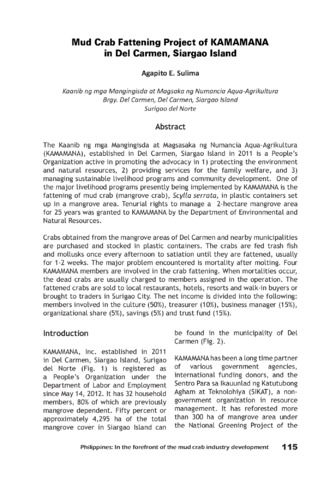Mud crab fattening project of KAMAMANA in Del Carmen, Siargao Island

ရှာဖွေ/ဖွင့်ပါ။
ရက်စွဲ
2017စာရေးသူ
Page views
598
Share
စိတ္တဇ
The Kaanib ng mga Mangingisda at Magsasaka ng Numancia Aqua-Agrikultura (KAMAMANA), established in Del Carmen, Siargao Island in 2011 is a People's Organization active in promoting the advocacy in 1) protecting the environment and natural resources, 2) providing services for the family welfare, and 3) managing sustainable livelihood programs and community development. One of the major livelihood programs presently being implemented by KAMAMANA is the fattening of mud crab (mangrove crab), Scylla serrata, in plastic containers set up in a mangrove area. Tenurial rights to manage a 2-hectare mangrove area for 25 years was granted to KAMAMANA by the Department of Environmental and Natural Resources.Crabs obtained from the mangrove areas of Del Carmen and nearby municipalities are purchased and stocked in plastic containers. The crabs are fed trash fish and mollusks once every afternoon to satiation until they are fattened, usually for 1-2 weeks. The major problem encountered is mortality after molting. Four KAMAMANA members are involved in the crab fattening. When mortalities occur, the dead crabs are usually charged to members assigned in the operation. The fattened crabs are sold to local restaurants, hotels, resorts and walk-in buyers or brought to traders in Surigao City. The net income is divided into the following: members involved in the culture (50%), treasurer (10%), business manager (15%), organizational share (5%), savings (5%) and trust fund (15%).
Suggested Citation
Sulima, A. E. (2017). Mud crab fattening project of KAMAMANA in Del Carmen, Siargao Island. In E. T. Quinitio, F. D. Parado-Estepa, & R. M. Coloso (Eds.), Philippines : In the forefront of the mud crab industry development : proceedings of the 1st National Mud Crab Congress, 16-18 November 2015, Iloilo City, Philippines (pp. 115-119). Tigbauan, Iloilo, Philippines: Aquaculture Department, Southeast Asian Fisheries Development Center.
ဘာသာရပ်
aquaculture; aquaculture economics; crab culture; cooperatives; environmental protection; feeds; feeding; livelihoods; mangroves; marine crustaceans; mortality; moulting; resource conservation; resource management; sociology; sustainability; sustainable development; trade; Scylla serrata; Philippines
